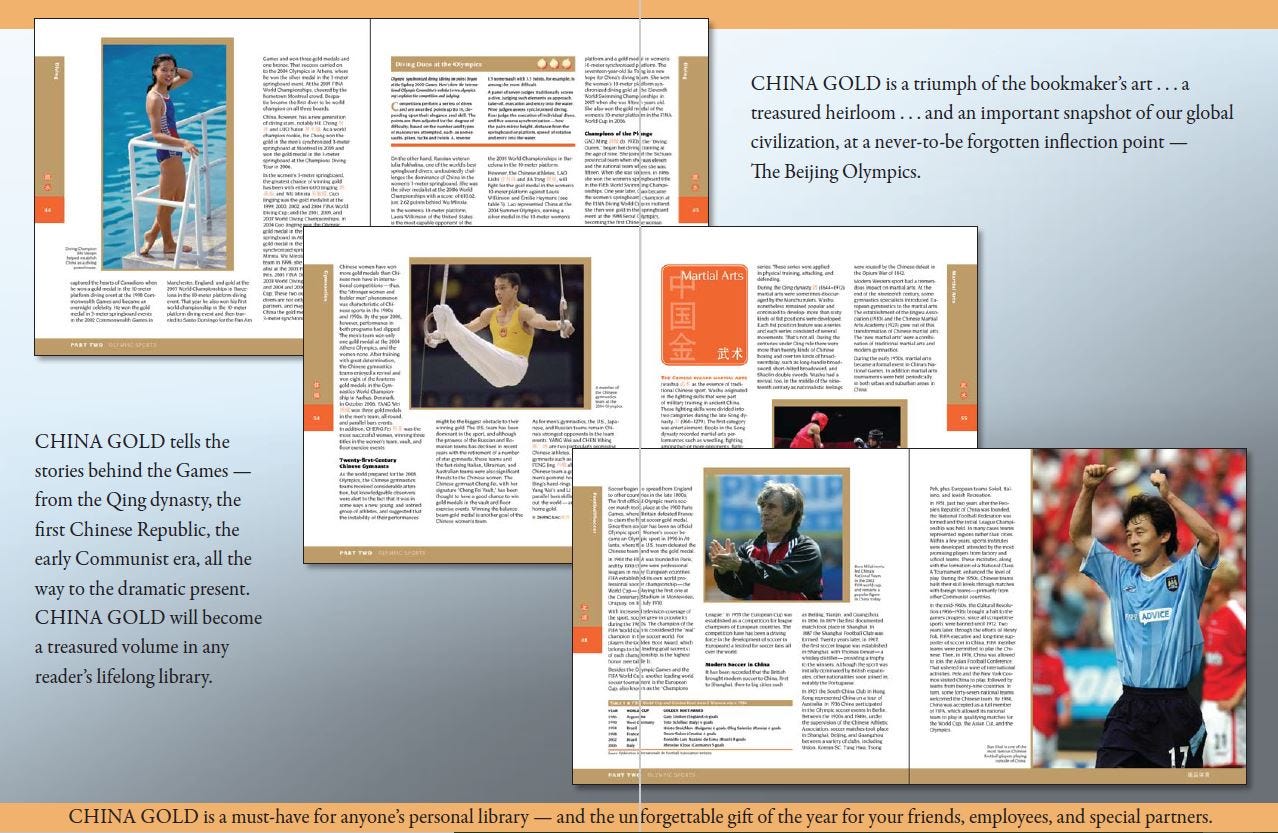What to think about the Olympics
As the Games open in Beijing, I'm thinking about how sports is a window into international relations, for better and for worse.
My company, Berkshire Publishing, had its first big score when we produced an Encyclopedia of World Sport for ABC-CLIO in 1995. I then ended up co-editing the International Encyclopedia of Women & Sports for Macmillan. And we’ve continued to bring out the occasional book on sports, always on a global theme. When we published China Gold: China’s Quest for Global Power and Olympic Glory in 2008, just before the Summer Olympic Games in Beijing, we were at a point when many saw China on a positive trajectory as a global stakeholder.
In 2008, China had joined the World Trade Organization, more foreigners were moving to China and learning Chinese, and investment was increasing rapidly. Chinese students poured into universities and schools around the world, and agreements to cooperate on climate change and fighting terrorism suggested that China was intent on building strong and productive international relations.
There were criticisms, too, notably over human rights and Tibet. But we published China Gold hopefully, writing:
Will China change the Olympics, or will the Olympics change China? Perhaps neither to the extent that some people may hope, but there’s no doubt that the ideals of the Olympics—of fellowship and good sportsmanship, of athletic prowess and determination, and of a global community united in working toward a common future—will influence people inside and outside China in this year of China Gold.
Fourteen years late, China’s rise to prominence is clear, but its influence is in doubt. Global opinion of China had sunk to a historic low. Even cooperation on climate change is problematic..
China has been drawing in, reducing global interaction and cooperation. Indeed, the COVID-19 pandemic has been a contributing factor, but it’s now a question whether China has any interest in integrating the Olympic ideals into its perspective on global leadership.
Nonetheless, cooperation with China is important to our common future. (I recommend this article, the best thing I’ve read recently about US-China relations: “Biden’s China policy needs to be more than Trump lite.”) Learning about Chinese history, culture, and politics is more important than ever. And China Gold: China’s Quest for Global Power and Olympic Glory remains a unique introduction to China and its people, as well as a companion to the 2022 Games.
China Gold contains glorious full-color chapters about the history of sports in China (including women’s sports in ancient China), traditional physical activities like tai chi and wushu, and extreme and new sports. There are chapters about economic, social, and environmental issues connected with the Olympics and fascinating stories from history, about individual athletes and political dramas connected with sports, including Ping-Pong Diplomacy, about which Chinese Premier ZHOU Enlai was quoted as saying, “Never before in history has a sport been used so effectively as a tool of international diplomacy.” The section on Taiwan’s participation in the Olympics is fascinating, too.
The book is available in paperback with a black-and-white interior ($29.95), as a full-color hardcover ($59.95), and as a PDF in color for immediate download ($19.95). Click here to buy. Or subscribe to this newsletter and wait for your discount coupon!
Berkshire Publishing is in the process of revamping its full range of China publications for the post-pandemic world. You can read about our work to educate Americans and other global citizens about China, an effort that has many challenges but also offers much that is positive, and vital to our common future. You’ll find a summary of our point of view and goals, and details about some of our major publications.
It’s Lunar New Year and I wish you health and good fortune in this Year of the Tiger. Fireworks are now banned, but I can still enjoy this Spring Festival video from Beijing, taken by my son Tom Christensen.









Good one, Karen!
Just FYI: A three book YA series I wrote on physics, published by the Smithsonian, has been translated into Chinese. It has won two major education awards in Shanghai. My daughter was visiting China and went to see the publisher, they took her to lunch and she had a great time. Anyway, the vibes I get from China regarding education are impressive. A US history I wrote was under contract with the same Chinese publisher and in the process of being translated into Chinese (imagine Chinese children reading about Abe Lincoln). That project seems to have come to a halt, which I guess is indicitive of something.
P.S. I love your very informative column. joy hakim